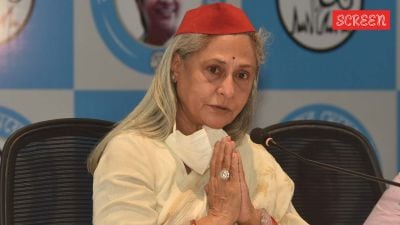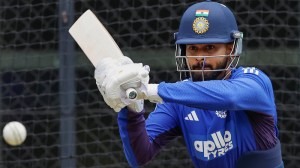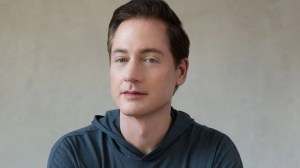Meet the parents
When producer Mehboob Khan wanted to bring 23-year-old Shamshad Begum from Lahore to Mumbai in 1942, he had to promise her father that she w...

When producer Mehboob Khan wanted to bring 23-year-old Shamshad Begum from Lahore to Mumbai in 1942, he had to promise her father that she would be treated like a princess.
Today, seated in her luxurious sixth floor apartment in lush Powai it took one week and several telephonic chats to get past her protective shield, daughter Usha, the 85-year-old Begum knows that the rest of the world is still fixated on Leke Pehla Pehla Pyaar.
But no one could have guessed what8217;s playing in her mind: 8216;8216;Tu Cheez Badi Hai Mast Mast,8217;8217; she adds after a long pause and a toothy smile. 8216;8216;I8217;ve liked many new generation songs and this is one.8217;8217;
Usha, her only child, is her universe. 8216;8216;Yehi mere aage aur peeche hai She8217;s the only one.8217;8217; Begum goes through the day with a list of things to remember on paper. There are other must-haves8212;cotton plugs to protect her sensitive ears and a walker for support.
But don8217;t be deceived by the infirmities. Step into an era thinking you8217;ll find broken crowns and dismantled thrones, and you look into laughing eyes. Mocking, wise eyes that never miss a thing.
8216;8216;Abhi tak haseen aur jawan hain woh galiyan, jahan hamne apni jawani luta di Evergreen are those pastures where I lost my youth,8217;8217; says 84-year-old composer Naushad Ali, whose phone hasn8217;t stopped ringing since the stereophonic release of Mughal-E-Azam.
But Naushad8217;s always worked overtime. He heads the Cine Society that was founded by Devika Rani and holds regular screenings of classics for its members. He also finds time to chair the Indian Performing Rights Society. A doting grandfather, Naushad lives with six granddaughters in his sea-facing suburban Mumbai bungalow. The disciplinarian begins each day with a half hour of yoga plus a workout on the exercycle.
And when he says, 8216;8216;Main hamesha mashroof rahta hoon I always keep busy,8217;8217; it sounds like he8217;s been plotting to recapture his lost kingdom. Naushad has just finished composing for next year8217;s Akbar Khan release, Taj Mahal8212;An Eternal Love Story, which includes two songs by lyricist friend Naqsh Lyallpuri.
Omkar Prasad Nayyar, his 79-year-old counterpart and the current remix icon, who spent most of his life composing 8216;8216;feelings8217;8217; in Guru Dutt8217;s words instead of music, reveals that he fought his battles using just one game plan8212;8216;8216;Sharab, shabab, kabab aur rabab Wine, women, kebabs and music.8217;8217;
Nayyar proudly recalls, 8216;8216;Right from 1954 to 8217;67, distributors would ask for the name of the composer, not the producer or director, and if they heard the name OP Nayyar they would declare that the film would be sold out.8217;8217; Then his shoulders droop. 8216;8216;There was never a time like that again,8217;8217; he adds.
The good times have translated into royalties in the remix era and these legends now earn between Rs 40,000 to Rs 1 lakh annually. Nayyar, who is estranged from family and lives in Thane, on the outskirts of Mumbai, recalls sitting on Shamshad Begum8217;s lap as a child at the All India Radio Studio in Lahore. 8216;8216;I get gooseflesh when I think of her first Hindi film Khazanchi,8217;8217; he says about the 1941 classic. 8216;8216;She had originality. Hers was a voice that sounded like a jingling silver coin, while Geeta Dutt was the black beauty with the velvet voice.8217;8217;
Nayyar says he doesn8217;t harbour any regrets and even likes some of remix producer Harry Anand8217;s versions. He spends Sundays watching back-to-back VCDs of films that he composed for, along with his favourite Hollywood westerns.
Another composer who8217;s completely content with his modest but unparalleled repertoire of 53 films including Footpath, Phir Subah Hogi, Kabhi Kabhie, and Umrao Jaan is Nayyar8217;s successor Mohammed Zahoor Khayyam Ashami. Khayyam will soon be back for his 54th film, Benares8212;19188212;A Love Story, based on Munshi Premchand8217;s novel by the same name, and Mehmood Sipla8217;s Sooraj Ek Dastak.
8216;8216;I8217;m very moody and choosy about the films I compose for,8217;8217; says the Jalandhar native, looking extremely serious before breaking into a laugh. 8216;8216;Yeh badi nuksaan di cheez hai because this temperament brings in financial difficulties.8217;8217; In his day, Khayyam pitted notes against those created by three other stalwarts8212;Roshan, Jaidev and Madanmohan. 8216;8216;The plus point was that all of us knew both Urdu and Hindi, unlike other great musicians like RD Burman.8217;8217;
The four were thick friends, but Khayyam was closest to the late ghazal king Madanmohan, whose never before released compositions were recently used to create 8216;8216;an old world charm8217;8217;, according to Yash Chopra in his latest release Veer-Zaara. 8216;8216;Madanmohan used to come home often, and we would drink whiskey for relaxation,8217;8217; he cackles. 8216;8216;He8217;d usually start singing and lose pitch8212;kitna apnapan tha There was so much camaraderie.8217;8217;
Khayyam is a typical Punjabi 8216;family man8217; who dotes on singer-wife Jagjit Kaur and his only son. The living room in his Mumbai apartment is filled with well-polished awards and statuettes. The National Award for Umrao Jaan and the Dinanath Mangeshkar award for excellence in music are most special, he says. But Khayyam struggles when asked to name his pals in the industry. 8220;I don8217;t know,8217;8217; he laughs, 8220;everything8217;s changed including the culture. There wasn8217;t so much running around, and musicians even sat down with the film8217;s stars and producer to listen to the dialogues of a film before they composed.8217;8217;
Lyallpuri, who began his career with a stage play he wrote to entertain friends, soon turned into a wordsmith penning verses for films like Khandan and Noori. He8217;s captured the era in his Banarasi paan wrapped in a scrap of Urdu newspaper. The 76-year-old, who has just finished a book of verse titled Teri Gali Ki Taraf, is also slated to write the lyrics for a Sahara film titled Hum Jo Keh Na Paaye.
When Bollywood slipped, he gracefully made his exit and turned to television in the late 8217;80s, writing lyrics for the Farooque Sheikh serial Shrikant. He won a TV Lyricist Of The Year award last year for the title track of Doordarshan8217;s Shikwah.
8216;8216;That was the time when good songs competed for air time, the difference now is that the worst songs are vying to be heard,8217;8217; he says. But Lyallpuri takes solace in Friday evening nisheshts poetry gatherings, which include the likes of Los Angeles-based poet Farhat Shahzad who wrote the lyrics for three of Mehdi Hassan8217;s albums and Ibrahim Ashq, the songwriter for Kaho Naa Pyaar Hai.
But there8217;s someone who sees no point in a comeback. 8216;8216;I8217;d rather enjoy life now with family and friends,8217;8217; says 85-year-old singer Manna Dey. Does that mean one will never hear Dey render Aye Mere Zohra Zabeen or Laaga Chunri Mein Daag again? 8216;8216;I sing very rarely for a close circle of friends but that8217;s it,8217;8217; says the singer who does a two-hour riyaz every day.
But perhaps paradise will be regained. 8220;Woh subah kabhi toh aayegi, in kaali sadiyon ke sar se jab raat ka aanchal dhalkega We will see that dawn again, when night8217;s veil will be lifted away from these dark ages,8221; says Khayyam, rendering lyricist Sahir Ludhianvi8217;s famous lines from the Raj Kapoor starrer Phir Subah Hogi.
8216;8216;Duniya saari badlegi, dhulke saaf hoke phir chamkegi The world will change, it will shine again,8217;8217; says Begum, rubbing her petite hands together like a fairy godmother casting a spell. We will hear sweet music again, they promise.
- 01
- 02
- 03
- 04
- 05































